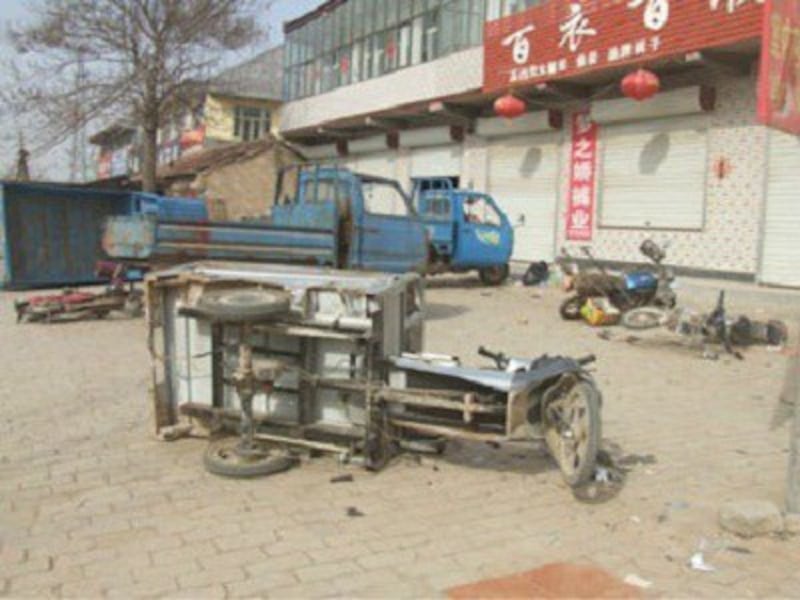Villagers in the eastern Chinese province of Shandong said on Thursday that local police "stood by and watched" during ethnic clashes last weekend in which their homes and shops were smashed up and many of them beaten, with an estimated 15 people sent to hospital.
A local official confirmed the rioting, sparked over the weekend by a dispute between local Han Chinese residents and Hui Muslims in Ningjin county, had taken place.
"There was quite a lot of damage, and there is a bit of a situation here," said the official, who answered the phone at government offices in Ningjin county's Changguan township. "Right now the [ruling Chinese Communist] Party and the government are working out what to do about it."
He confirmed that some people had been injured in the violence. "Right now they are all in the hospital," he said.
Retaliatory attack
Han Chinese residents of Tianzhuang village in Ningjin claimed that over 1,000 Hui Muslims from the neighboring Changguan village had rioted in Tianzhuang on Saturday.
A restaurant owner surnamed Tian in Tianzhuang said "more than 100" police officers stood by and watched as local people were attacked.
"The police said they hadn't had any orders, and so they couldn't do anything," he said. "They just stood to one side ... and watched us get beaten," he said.
A Han Chinese shop owner surnamed Zhang said the rioting was apparently a retaliatory attack following an earlier dispute with some Hui youths who had been teasing local schoolchildren.
"More than 1,000 [Hui] people came into the village, and they were beating people and smashing stuff left, right, and center," Zhang said. "They smashed everything to pieces."
A second woman, also surnamed Zhang, said that between 10 and 20 Han Chinese were seriously injured during the riots.
"Between 10 and 20 people were beaten up and injured," she said. "They have all gone to hospital."
She said most of the male Han Chinese population of Tianzhuang had gone to seek factory and construction work elsewhere in China.
"Only a few of them have stayed home," she said. "There were about 1,000 Hui people, and they were smashing up our houses, shops, doors, and windows."
"If they saw someone, they would beat them up.... Their injuries weren't minor; they were pretty serious."

Knives and vandalism
Tian said the rioters wore white caps and carried sticks and chopping knives, and had come in and started smashing up his premises.
"They chopped anyone they saw and they smashed up my restaurant," he said. "There were only just over 100 of us Han, and more than 1,000 of them."
"There was no way we could beat them, so we fled ... I heard some of them came from further afield. There were too many of them," Tian said.
He estimated that 15-16 people were injured with knives, with the most seriously hurt going to hospital.
Villagers said the local government was now funding clean-up operations and repairs to the damage caused in the riot.
A man who answered the phone at the home of the Tianzhuang village Communist Party Secretary declined to be interviewed.
"No, I'm not [Secretary Zhang]. He has gone out," the man said. "When the party secretary gets back, he will call you back. Goodbye, now."
A police officer who answered the phone at the local police station also declined to comment. "I don't know about this," he said.
Calls to official Chinese media organizations had met with a refusal to cover the incident, for "lack of evidence," local people said.
Ethnic Hui
China's official media rarely reports incidents involving ethnic conflict, and when it does, is usually under orders to use only approved dispatches from the state-run Xinhua News Agency.
Shandong is no stranger to conflict between Hui Muslims and Han Chinese, with rights groups reporting clashes involving thousands of people in Huimin county in August 2007.
In 2000, official media reports said that rioting over the advertisement of "halal pork" by a Han Chinese vendor had resulted in the deaths of six Hui Muslims.
China's Hui minority are the descents of Arab, Persian, and Central Asian traders who settled in China centuries ago. They gradually intermarried and acquired Chinese language and customs, though holding on to some Muslim traditions.
Officially recognized as the third largest of China's 56 ethnic minorities, the Hui number around 10 million and are defined as Chinese-speaking, historically Muslim communities not included in other ethnic groups. Northwestern China's Qinghai, Ningxia, and Gansu provinces have the most Hui.
Reported by Lin Jing for RFA's Cantonese service and by Qiao Long for the Mandarin service. Translated and written in English by Luisetta Mudie.
